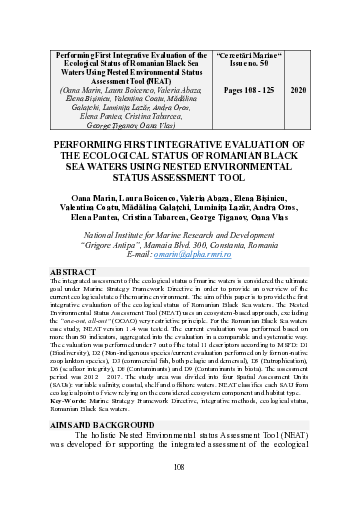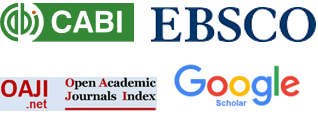Performing First Integrative Evaluation of the Ecological Status of Romanian Black Sea Waters Using Nested Environmental Status Assessment Tool
DOI:
https://doi.org/10.55268/CM.2020.50.108Keywords:
Marine Strategy Framework Directive, integrative methods, ecological status, Romanian Black Sea waters.Abstract
The integrated assessment of the ecological status of marine waters is considered the ultimate goal under Marine Strategy Framework Directive in order to provide an overview of the current ecological state of the marine environment. The aim of this paper is to provide the first integrative evaluation of the ecological status of Romanian Black Sea waters. The Nested Environmental Status Assessment Tool (NEAT) uses an ecosystem-based approach, excluding the “one-out, all-out” (OOAO) very restrictive principle. For the Romanian Black Sea waters case study, NEAT version 1.4 was tested. The current evaluation was performed based on more than 50 indicators, aggregated into the evaluation in a comparable and systematic way. The evaluation was performed under 7 out of the total 11 descriptors according to MSFD: D1 (Biodiversity), D2 (Non-indigenous species/current evaluation performed only for non-native zooplankton species), D3 (commercial fish, both pelagic and demersal), D5 (Eutrophication), D6 (seafloor integrity), D8 (Contaminants) and D9 (Contaminants in biota). The assessment period was 2012 – 2017. The study area was divided into four Spatial Assessment Units (SAUs): variable salinity, coastal, shelf and offshore waters. NEAT classifies each SAU from ecological point of view relying on the considered ecosystem component and habitat type.
Downloads
Published
2020-12-20
How to Cite
Marin, O., Abaza, V., Bișinicu, E., Boicenco, L., Coatu, V., Galațchi, M., Lazăr, L., Oros, A., Pantea, E., Tabarcea, C., Țiganov, G., & Vlas, O. (2020). Performing First Integrative Evaluation of the Ecological Status of Romanian Black Sea Waters Using Nested Environmental Status Assessment Tool. Cercetări Marine - Recherches Marines, 50(1), 108–125. https://doi.org/10.55268/CM.2020.50.108
Issue
Section
ORIGINAL ARTICLES
License
This is an open access journal, which means that all content is freely available without charge to the user or his/her institution. Users are allowed to read, download, copy, distribute, print, search, or link to the full texts of the articles, or use them for any other lawful purpose, without asking prior permission from the publisher or the author. This is in accordance with the BOAI definition of open access.






